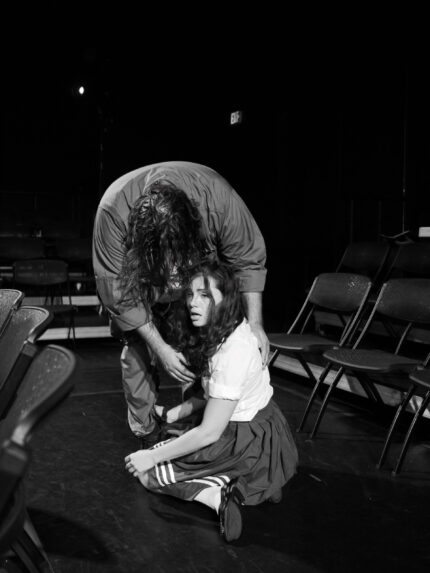
Robby Ramos and Juliana Martinez in a tense moment in The Walls Have Ears at Westchester Cultural Arts Center
By Oline H. Cogdill
Politics, family and revolution—each volatile in their own way—provide the harrowing backdrop for Robby Ramos’ debut drama The Walls Have Ears, having its world premiere through May 14 at the Westchester Cultural Arts Center in Miami.
Set during the 1962 Cuban Missile Crisis, The Walls Have Ears takes place at “Presidio Modelo” (model prison) on Cuba’s Isla de Pinos where a warden called “Madre” demands a comrade in the revolution interrogate an obviously tortured prisoner, who has been dragged in, his head covered by a bag.
Simultaneously, a radio host at Miami’s powerful WQAM plays upbeat ‘60s rock such as “Venus in Blue Jeans,” “Surfin’ Safari” and tunes by the Four Seasons, with intermittent political commentary and news briefs. The happy rock songs are in direct contrast to the brutality happening in the Cuban prison. The two seemingly incongruous situations will eventually intersect with a broadcast on live radio.
Audience members are indeed the walls and the ears of the action, sitting around the three-tiered set, sometimes inches away from the actors in an immersive experience.
The Walls Have Ears unflinchingly examines the brutality of the prison camp and the treatment of dissidents.
Madre pushes harder and harder at Papo, a prison employee, to force political prisoner Rafa to sign a confession that will name other dissidents.
Soon, relationships emerge. Madre and Papo fought together for the Revolution, possibly were even sexually intimate. Rafa isn’t just another prisoner—he is Papo’s younger brother. The connections are complete when the brothers’ younger sister, Ava, is brought in by Madre, who demands the teenager explain a poem she wrote comparing communism to sexual fluid that “seeps into your body, grows into your children.”
Family bonds, that Papo left behind when he joined the revolution, rear up as he pushes back at torturing his brother or the fate that his sister may face. Madre has no such sentimentality, believing family means nothing in the revolution.
She says, “Where was your brother and sister when I was stitching your wounds in the mountains, ah? Scribbling filthy poetry and drawing bullshit cartoons—give me a fucking break, ‘family.’ The hunger and the cold, the winter and the rain. When we had no coats, no blankets, no shoes, where were they? This revolution saved you, you ingrate.”
Strong performances by Monica Steuer as Madre, playwright Robby Ramos as Papo and Bill Schwartz as the American radio host Bill Kenny enhance the immersive experience. They receive strong assistance from David Zaldivar as Rafa and Juliana Martinez as Ava.
Cuban-American actor Gabriel Bonilla making his directorial debut in The Walls Have Ears keeps the play constantly in flux, whether making the conversations fraught with tension or the action scenes. Bonilla is both served and hampered by theater in the round and the closeness of the audience. The action careens from the brightly lighted radio station to the center where a desk, phone, fridge and a couple of chairs serve as Madre’s office to a raised area where a chair is the focal point and the interrogations occurs.
All the drawings on the set’s office floor, are replicas of the actual drawings from the prison cells in Cuba. But with a row of audience members inches from Madre’s office, it is hard to see the poignant drawings and sometimes the action in the office. The fight scenes are grippingly realistic, moving throughout the audience, so close that some playgoers flinched or moved to avoid the action coming too close.
Miami-based playwright and actor Ramos was inspired by the experiences of his grandfather, a Cuban dissident who served time at the prison camp where the play takes place. In a press release, Ramos said The Walls Have Ears is a “love letter to Cuban political prisoners and the Cuban diaspora.”
It is obvious that Ramos is passionate about this story and his closeness to the subject matter shows. But the script could have benefitted from a dramaturg and a trimming as it feels a bit long even at its running time of an hour, 40 minutes without an intermission. Still, we’d like to see more work from Ramos, who also plays wrestler Diego Cottonmouth on the Starz series “Heel.”
The production’s immersive experience begins when arriving at the theater as the work of Cuban-American artist Kiki Valdes are on display in the lobby of the Westchester Cultural Arts Center. Each painting in the exhibit was inspired by The Walls Have Ears.
The producers also have announced that a portion of the play’s proceeds will be donated to Cuba Decide, a human rights organization co-founded by Rosa Maria Payá, the daughter of late Cuban dissident Oswaldo Payá.
The Walls Have Ears (Las Paredes Oyen) runs through May 14 at the Westchester Cultural Arts Center (WCAC), 7930 SW 40th Street, at the main entrance to Tropical Park, Miami. The Walls Have Ears is performed in English through April 23; Las Paredes Oyen is performed April 27 through May 14 in Spanish. The work of Cuban-American artist Kiki Valdes on display in the theater lobby were inspired by the play. Running time: one hour, 40 minutes; no intermission. Tickets prices are $35, $45, $55, $65; visit wcacenter.org or call 305-456-6731. More information is at thewallsplay.com (English) and lasparedesoyen.com (Spanish).









 A PaperStreet Web Design
A PaperStreet Web Design
